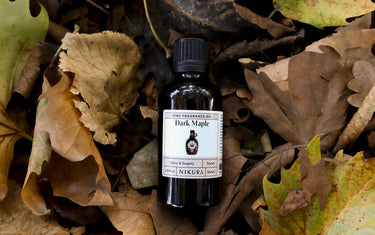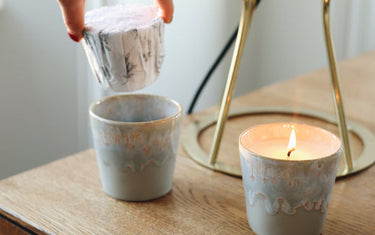5 min read / 15 December 2022 / Laura Garvin Gomez
Top 10 Ways to Use Fragrance Oils
Discover the ten most popular ways to use fragrance oils in your home.

Fragrance oils are much more versatile than they seem.
While some may think of them as just another format for scenting the home, fragrance oils can be used in far greater ways if you're given the right tips and tools to make them shine.
Available in a wide variety of aromas, fragrance oils can accommodate to almost anyone's personal tastes, and are a much cheaper alternative to a number of household remedies that would otherwise be seen as a luxury.
We'll be counting down our top ten favourite ways to use fragrance oils around the home, as well as what they are and how they can positively benefit your lifestyle.
What are fragrance oils?Not too dissimilar to perfumes in their chemical composition, fragrance oils are synthetic products designed to draw upon or mimic a particular scent. Natural scents like jasmine are often featured as an alternative to botanical oils, but it is also not uncommon to see fragrance oils with more whimsical names like Frosted Wonderland or Cosy Fireplace. These types of fragrances intend to capture a mood or moment as opposed to a naturally-occurring aroma, and are what mainly separate many fragrance oils from their essential oil "opponents". |
Are fragrance oils the same as essential oils?
Though the two may appear very similar at surface level, fragrance oils and essential oils are not the same and should never be considered as such.
Unlike fragrance oils, essential oils are completely natural products that are taken from plants, fruits, and other botanicals.
Their benefits for the body and mind are what separate them most from fragrance oils, as fragrance oils are normally only intended to "smell good" and nothing more.
That being said, there are many reasons why one might choose to use fragrance oils above essential oils in their home.
Learn more about the difference between essential oils and fragrance oils.
What are the best ways to use fragrance oils?
Scented products seem to be everywhere, yet information about how to use fragrance oils is limited, and many people simply aren't aware of all the great things you can do with the right fragrance oil at your disposal.
Some of the most popular applications for fragrance oils include use in:
- Diffusers
- Candle making
- Soap making
- Wax melts
- Potpourri
- Perfumes
- Bath salts
- Reed diffusers
- Shampoo bars
- Cotton balls

Can I use fragrance oils in a diffuser?
Diffusers have always been the classic choice for dispersing pleasant aromas around your home.
Whether you have a preference for electric diffusers or good, old-fashioned oil burners, fragrance oils work remarkably at elevating the atmosphere of a room.
They have also been known to last longer than traditional essential oils due to their specifically-designed synthetic composition, which can carry a scent further across several areas at once.
Learn more about diffusers and how to maintain them.
Can I use fragrance oils in candle making?
Using fragrance oils for candle making is a tale as old as time - and an alliance that should not be overlooked.
Many fragrance oils, particularly our fine fragrance oils, have been especially designed for use in candles, and can therefore maintain very powerful and long-lasting scent throws when mixed in with wax.
Their sheer variety allows for easy transition between seasonal and day-to-day candles, as well as opening up the possibility of creating candles for specific rooms or family members or friends as gifts.
Fragrance oils are also considered much easier to work with as they have more consistent flash points than essential oils, and don't carry as much of a risk of smelling slightly different from batch to batch.
For this reason, fragrance oils are a favourite amongst beginners and seasoned candle makers alike.

Can I use fragrance oils in soap and shampoo bars?
As with candles, fragrance oils are also considered a favourite amongst soap makers for their versatility and ease.
Newcomers to soap making can often find the process challenging compared to other related hobbies, however the use of fragrance oils breaks many of the difficult barriers while still providing a lasting, unique scent.
Soap makers in particular tend to enjoy lighter aromas like ocean breeze or fresh linen as they align with the perception of cleanliness, but there are also many other scents for soap to choose from.
Similarly, you can use fragrance oils in shampoo bars which is a great way to save some money on luxuriously-scented haircare products while still achieving a similar effect.
Adding a few drops of fragrance oil to your homemade shampoo bar can produce a long-lasting and impactful aroma to carry with you throughout the day.
Can I make wax melts with fragrance oils?
For those than aren't a fan of the (sometimes tricky) intricacies of candle making, wax melts are a viable alternative for money savers while still producing a wonderful aroma around your home.
As wax melts are so similar to candles, fragrance oils respond just as positively, and can even be explored at greater lengths depending on the type of wax melt you feel like creating.
Sound like something you want to get involved in? Our complete guide to making wax melts as well as our best fragrances for wax melts can help get you started.

Can I use fragrance oils in bath salts?
Bath salts are everywhere in the luxury scent market, and can end up being quite expensive despite their relative simplicity.
Making your own bath salts at home using fragrance oils can combat these unnecessary expenses while still giving your bathroom a spa-like feel.
Can fragrance oils be used in perfumery?
Fragrance oils are, for all intents and purposes, a type of perfume.
While they may not be suitable for direct application to the skin, combining them with a skin-safe carrier oil can produce virtually the same effect at a fraction of the cost.
You can apply the mixture at will to your pulse points, or alternatively use a spray bottle of your choosing.
Can fragrance oils be used in reed diffusers, potpourri and cotton balls?
Don't have an electric diffuser or oil burner to hand? These common techniques can help refresh your home without the need for additional gadgets.
Reed diffusers are easy, passive alternatives to electric diffusers that are simple to make or top up with fragrance oils.
Similarly, adding a few drops of fragrance oil to a bowl of potpourri can enhance the scent and make it last longer in your spaces.
If neither of these methods sound appealing, a simple cotton ball topped with fragrance oils is all it takes to freshen up cupboard corners or nooks in the home.

However you choose to enjoy your fragrance oils, there is a certain comfort in experiencing scents you may not have otherwise come across.
Whether you're exploring a new hobby or are keen to find a new signature scent, there's a fragrance oil for everyone's needs and emotions.










